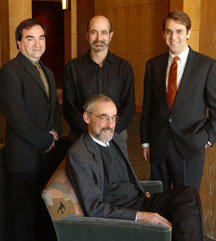|
Web Exclusives: Alumni Spotlight
June 6, 2004: Lawyers
in Boston’s service As an idealistic young lawyer fresh out of Harvard Law School in the early 1970s, Michael Haroz ’67 worked in the inner-city neighborhood of Field’s Corner, in Dorchester, Massachusetts, for Greater Boston Legal Services, which provides free civil legal assistance to low-income people in Boston. Thirty years later, the view over Boston Harbor from his gleaming, high-rise offices at the firm Goulston & Storrs, couldn’t be more different. Yet, even though he’s served as the firm’s managing director, his work still takes him back to the same neighborhood — he recently developed a community center for the more than 10,000 Vietnamese immigrants who live in Field’s Corner. His paycheck may be a bit fatter now, but for Haroz and three other Princeton alums working at Goulston & Storrs, the opportunity to do pro bono work as a major part of their daily legal work drew them to — and keeps them at — the firm, which has won several American Bar Association awards for its service to the community. “For most people there’s a choice to be either in the business world or being involved with the community,” says David Abromowitz ’78. “In this atmosphere, we can do both.” Along with Haroz and Abromowitz, Kitt Sawitsky ’71 and Andrew Zelermyer ’85 say their jobs allow them to treat pro bono clients like any other, devoting the same amount of time and firm resources they might to a paying client. Sawitsky, for example (who is the firm’s current managing partner), is the chairman of the board of directors of STRIVE, an organization that recruits and trains workers from low-income neighborhoods, and uses his contacts and experience as a corporate lawyer to facilitate the organization’s access to the Boston business community. Zelermyer, who specializes in real estate law, got the firm’s blessing to spend some of his billable hours as a member of a panel of business and community leaders who addressed social justice issues affecting the Greater Boston area, and has also helped a local community-development company create affordable housing. “By bringing business skills to these nonprofit organizations, you’re empowering them to do their work on a larger scale, and you can have a broader affect than as a public defender,” says Haroz. “I don’t think I could have developed the community center without the experience of working at a corporate business law firm.” The lawyers’ theory is that pro-bono work does not have
to be separate from a firm or business’s existing strengths.
“You can learn a craft and practice it at a high level, but
it doesn’t mean you don’t have a role to play in the
larger world,” says Sawitsky. By Kathryn Beaumont ’96 Kathryn Beaumont is assistant director of development planning at Harvard.
|
||

